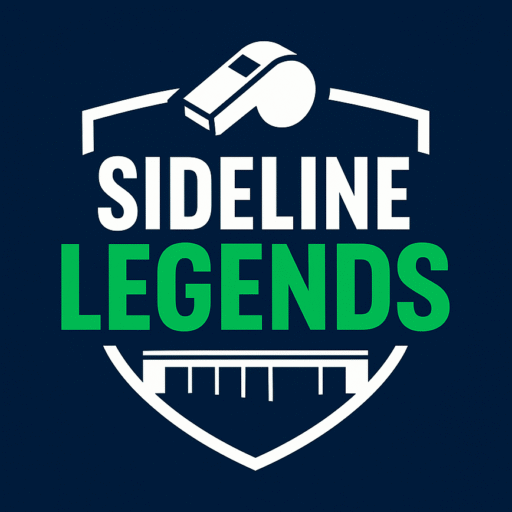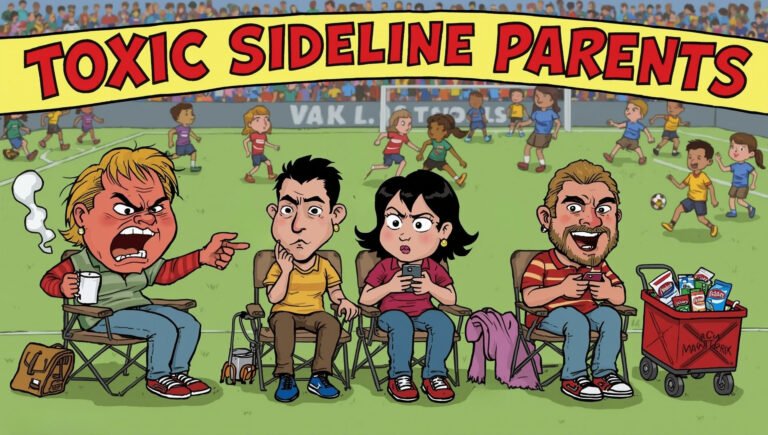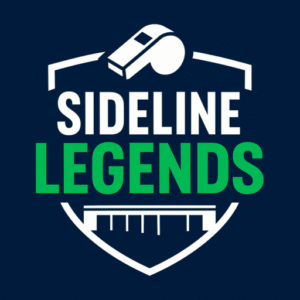Every youth sports team has one: the sideline expert.
They think they’re Bill Belichick — minus the hoodie, plus way more unsolicited advice (and way less chill).
They’re not on the roster. Not on the coaching staff. Yet somehow they’re always pacing, planning, and presenting like they’re leading Team USA to Olympic glory.
Let’s break it down.

Who Is the Sideline Expert?
You spot them before your tires hit the grass.
There they are, hovering by the coach with that serious, slightly sweaty, clipboard-energy face.
Kids are stretching. Chairs are unfolding. And they’re already reliving last week’s “devastating loss” like it was Game 7 of the Stanley Cup. (Spoiler: no one under 4 feet tall remembers it.)
They jog over pre-practice with a fake casual, “Hey Coach!” and immediately slide into improvement suggestions like they’re interviewing for a job that doesn’t exist.
And after practice? They’re waiting to launch into a play-by-play breakdown while the real coach is just trying to get to their car.
Sometimes, they even bring visual aids — stat sheets they printed out at 2 a.m. after a burst of inspiration, laminated diagrams of “new formations,” or worse: an actual whiteboard. They speak in acronyms, name-drop obscure plays, and quote YouTube coaching clinics like scripture.

Signs You’re Dealing with a Sideline Expert:
They use terms like “spacing,” “tempo control,” and “ball movement” in casual sideline convos.
They start every critique with “Not to overstep, but…” (They’re overstepping.)
They reference their playing days from high school JV or their undefeated beer league softball run.
They show up with laminated brackets “just in case.”
They pace like an unpaid assistant coach in full team merch.
They whisper audibles to their kid mid-play, like it’s the Super Bowl.
They talk about momentum swings during warmups.
They own a whistle… and have brought it to at least one practice.

What Do Sideline Experts Actually Do?
- Before Practice: Pitch unsolicited drill ideas with faux humility.
- After Practice: Analyze why “scrimmage intensity” felt off.
- Before Games: Whisper about matchups like they’re breaking NFL news.
- After Games: TED Talk. Every time. With napkin diagrams and finger-pointing.
- During Water Breaks: Stage interventions because “this can’t wait.”
Honestly, the sideline expert brings the kind of sideline energy that’s only matched by warm-up songs parents secretly hate.
Meanwhile, half the team still struggles with cleat direction and remembering which color they’re wearing.
And let’s not forget their game-time posture: arms folded, squinting at the field like they’re reading wind patterns, offering silent sideline critiques and passive-aggressive praise like, “That was… better.”

Coach POV: Trapped in the Chaos
According to the Positive Coaching Alliance, youth coaches are most effective when parents provide support rather than pressure. That support goes a long way when it replaces criticism with encouragement and trust.
Coaches are out here juggling 18 sugared-up kids, 14 group chats, 47 missing water bottles, and the horrifying logistics of a rotating snack schedule. The last thing they need? A sideline expert sneaking up mid-practice with a new offensive scheme scribbled on the back of a grocery receipt.
They’re dodging “quick chats” after every game, faking phone calls, and sometimes even using their own kid as an escape plan.
They didn’t sign up for a tactical shadow staff.
How to Actually Help (Without Being That Parent)
- Bring snacks (bonus points for Capri Sun variety packs).
- Cheer loudly (for everyone, not just your kid).
- Help set up tents and wrangle siblings.
- Offer encouragement instead of criticism.
- Volunteer for things that actually help, like ride shares or cleanup duty.
- Stay positive (your kid isn’t getting scouted today).
- Trust the coach. They’re doing more than you see.
Sometimes the best thing you can do is pull up a chair, sip that iced coffee, and enjoy the joyful chaos.
Because youth sports aren’t about perfection. They’re about popsicles after practice, kids forgetting their positions, and the pure joy of playing.
Final Word to the Sideline Expert
You love your kid. You love the game. We love that.
But maybe let the coach coach.
And save your laminated halftime speech for your fantasy football league.
Let the kids fumble, laugh, learn, and grow without feeling like they’re in a playoff game every Saturday morning.
This isn’t the Super Bowl. It’s the backfield behind the elementary school.
And those mini athletes? They just want snacks, high fives, and maybe the red Gatorade.
Got a ridiculous sideline moment to share? Drop it in the comments! Best story gets our eternal sideline respect.
#sidelineexpert #youthsportschaos #coachsquad



